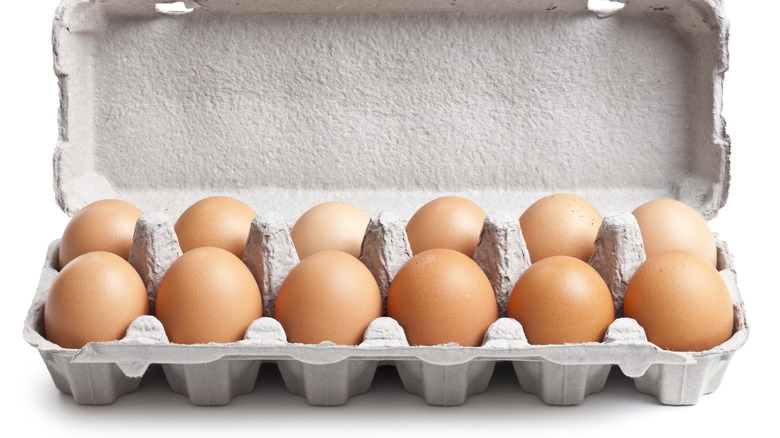What Does It Mean If Your Egg Has A White Or Clear Yolk?
It's common knowledge that more brightly colored egg yolks equal healthier chickens and more nutrients ... or is it? As it turns out, that common knowledge is actually just a big myth — those average yellow yolks have the same vitamin and mineral content as their bright orange counterparts. But what if you encounter an egg yolk that's so pale it's basically white? Or even clear? Never fear! There is nothing inferior about colorless yolks either.
The color simply boils down to what the chickens eat. Some diets will result in a sunny yellow while others will bring about a fiery orange, near red, or completely pigment-free yolk. To be fair, a white or clear egg yolk might be a little off-putting if you've never encountered such a thing before. Nevertheless, they're perfectly safe to consume and just as healthy as the more vibrant colors you're probably used to. So dig right in and enjoy the same nutrition as always.
What are clear egg yolk laying hens eating?
There's a good chance you'll never encounter an egg with a white or clear center unless you travel to certain parts of Africa where the chickens are primarily fed sorghum. This pale-colored grain passes its lack of pigment on, resulting in plain white to transparent yolks. Research on sorghum-fed chickens has shown that their eggs retain the same nutritional value as corn-fed chickens. There's even an upside — eggs with pale yolks may contain less cholesterol.
U.S. chickens, on the other hand, mostly eat yellow corn, which is why their yolks are the color that they are. Yellow corn and alfalfa both contain xanthophyll, a pigment that's passed on to the eggs. It's a type of carotenoid pigment, also found in fruit like oranges and papayas. Yellow or orange yolks can result, depending on how much of the stuff the chicken gobbles up. One particular xanthophyll, lutein, is often supplemented in American poultry feed.
While clear, white, yellow, and orange egg yolks all have the same basic nutritional value, there is one slight exception where darker yolks do have higher levels of a couple of specific nutrients. Darker egg yolks may contain more vitamin D, and egg-laying chickens may be fed flax seed to increase their production of omega-3 fatty acids, also leading to darker yolks. But you won't always be able to tell that this is the case just from looking at them, as plenty of hens who aren't fed flax still produce darker yolks based on their particular diets.
Does yolk color affect flavor?
There may not be a nutritional difference between yolks of different colors, but plenty of people will tell you that there is definitely a difference in their taste. Supposedly a yolk with a deep rich hue will also have a deeper, richer taste, but since this hasn't been proven, it's possible that it could be all in our heads. As people have come to associate deep orange eggs with more nutrition, it's reasonable that the same association has been made between color and taste.
If you do encounter a white or clear egg yolk there's really no reason to think that it will be flavorless. As with the safety and nutritional aspects, these eggs are just like any others. You're just unlikely to encounter them unless you're traveling overseas or encountering hens that have been fed a particularly colorless diet. All the, it would be interesting to do a blindfolded taste test to see if clear egg yolks can be differentiated from yellow or orange ones.


